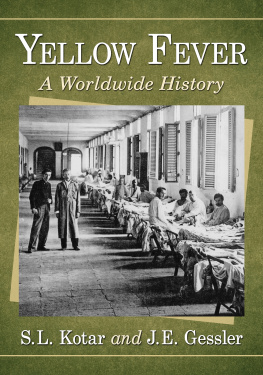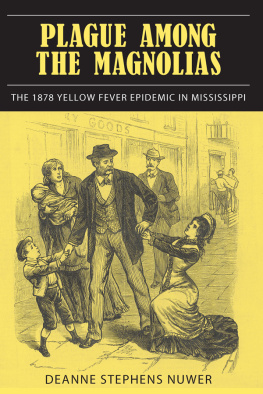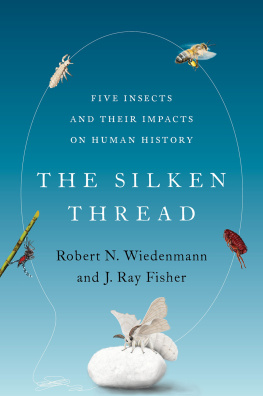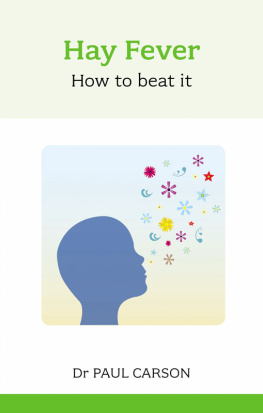Acknowledgments
Though I never had the honor of meeting any of the people in this story, I admire them above and beyond what could be expressed in the pages of this book. Whether the martyrs of Memphis or the martyrs of science, their courage, suffering and sacrifice are almost unmatched in todays world.
As long as I live in Memphis, I will see the ghosts of this story in the doorways of churches, on the street corners of the Pinch, along Adams and Main and in the gravestones of Elmwood. Likewise, my admiration knows no bounds for the scientists who sacrificed so much in the fight against yellow fever: Jesse Lazear, Walter Reed, James Carroll, Aristides Agramonte, Carlos Finlay, Max Theiler, among others. In an age where heroism can be so hard to come by, the fourteen human volunteers in Walter Reeds experiments amaze and inspire me.
In writing about history, a book is only as good as its research.
For their help, time and support, I thank those in the Memphis and Shelby County History Room at the Memphis Library, particularly Patrica LaPointe. Not only did she help me make some of the connections vital to this story, but she granted me access to so many irreplaceable, original documents. I also want to thank Joan Echtenkamp Klein and Claudia Sueyras with the Philip S. Hench Walter Reed Collection at the University of Virginias Claude S. Moore Health Sciences Library. Their Walter Reed Collection is beautifully maintained; I rarely needed their assistance and that is a tribute to such an organized and accessible historical collection.
Also deserving of recognition are the curators of the Mississippi Valley Collection at the University of Memphis, the Health Sciences Library at the University of Tennessee in Memphis, the New York Academy of Medicine, the Library of Congress and the National Library of Medicine, as well as Georgia Fraser at Elmwood Cemetery, Elizabeth Wirls at the St. Marys Episcopal Cathedral in Memphis, Professor Gary Lindquester in the Rhodes College Department of Biology and Ron Brister at the Memphis Pink Palace Museum.
One of the most valuable lessons I have learned as a writer is to be a reader of great writing. I have had the privilege to know and learn from some truly great writers: Candice Millard Uhlig, a gifted author and cherished friend; Hampton Sides, who was kind enough to give a first-time author and fellow-Memphian his help and encouragement; and Robert M. Poole, whose talent as an editor is exceeded only by his talent as a writer. A former executive editor at National Geographic, Bob Poole saw enough potential in me as a writer to give me a chance. I thank him for that.
I would also like to thank Mary Collins, a professor at the Johns Hopkins Zanvyl Kreiger School of Arts and Sciences, who has pushed me, challenged me and taught me. She was involved in the proposal for this book as well as in editing early drafts. I would also like to thank David Everett, my thesis advisor in the Hopkins writing program who first introduced me to the genre of narrative nonfiction.
So many friends offered their encouragement and support during this project. I would like to thank personally Allison Cates, Claire Davis, Jennifer Fox, Tessa Hambleton, Davida Kales, Lauren Kindler and Margaret McLean. Special thanks to Andy Cates, a long-suffering champion of my writing.
I am eternally grateful to my parents, Tom and Betsy Caldwell, and my in-laws Glenn and Nancy Ann Crosby, for their unceasing support, time, encouragement and commitment. I am indebted to them for allowing me to have a career in writing as well as a family without giving up one for the other. My parents have taught me to follow my passion and never once questioned where it might take me. I thank them for instilling in me such a valuable lessonthat life is too short to spend it doing anything other than what you love. As Memphians, Nancy Ann and Glenn Crosby took an active interest in this story; as a doctor, Glenn Crosby allowed me to sit in his study and riffle through medical texts; and as my in-laws, they offered their steadfast encouragement.
I would also like to thank other family members who have been sounding boards and sources of strength. My sister Lindsey has been an ever-present and perpetual believer in me, and I thank her for her unconditional love and support. Scott Crosby, an avid reader of nonfiction, always seemed sure that I would write this book. I thank him for his optimism and belief in me. Likewise, other family members have been stalwart sources of support and encouragement: Glenn Crosby, Liz Crosby, Meg Crosby and Elizabeth Crosby.
Special thanks to Mark Crosby for his photographic talents. I owe a debt of gratitude to Mark for accompanying me to Cuba in search of forgotten places. The trip would not have been the same without him; the book would not have been the same without him.
I am greatly indebted to my agent, Ellen Geiger, who was willing to take a chance on an unknown author. More than simply believing in me, she persisted until this story found its rightful place. Without her loyalty and energy, this book would never have happened. I am also grateful to my editor, Natalee Rosenstein, for her confidence in me. She took a leap of faith, and I thank her for it.
I will be forever grateful to my husband and two daughters for their own sacrifices during this project. They were patient participants in a lengthy, involved and often-chaotic process. My daughter Morgen, a master of self-expression, reminds me daily of the gift of storytelling. I thank her for giving up some of her mother to this book. Keller, who was born midway through this project and learned to be lulled to sleep by the sound of typing, has been a quieter, but no less effective, source of inspiration and encouragement. Finally, my husband, Andrew, has been unfailing in his support of me since the day we met. I am forever indebted to him for believing in meas a writer, as a wife, as a mother. Thank you.
Selected Bibliography
Archives and Collections
American Lloyds Register of American and Foreign Shipping 1865, Emily B. Souder.
Claude Moore Health Sciences Library, University of Virginia
The Jefferson Randolph Kean Papers
The Philip S. Hench Walter Reed Yellow Fever Collection
Public Health Papers and Reports, presented at the Twenty-Ninth Annual Meeting of the American Public Health Association, Buffalo, NY, September 16 -20, 1901
Senate Document No. 822
The Wade Hampton Frost Papers
Walter Reed Letters
The William Bennett Bean Papers
Dee J. Canale, M.D., Yellow Fever and Medical History Private Collection
Elmwood Cemetery Charles C. Parsons File Ledger for August and September 1878 burials at Elmwood William J. Armstrong, Armstrong Family File
Health Sciences Historical Collection, University of Tennessee
Library of Medicine Simon R. Bruesch Collection
Library of Congress, Rare Books Collection
Conclusions of the board of experts authorized by Congress to investigate the yellow fever epidemic of 1878: being in reply to questions of the committees of the Senate and House of Representatives of the Congress of the United States, upon the subject of epidemic diseases. Washington, DC: 1879.
Proceedings of the Board of Experts authorized by Congress, to investigate the yellow fever epidemic of 1878: Meeting held in Memphis, Tenn., December 26th, 27th, 28th, 1878. Washington, DC: 1879.
Sigsbee, Charles Dwight. The Maine. New York: The Century Co., 1899.
Yellow Fever Bill. Washington, DC: 1879.
Memphis History Exhibit, Pink Palace Museum







